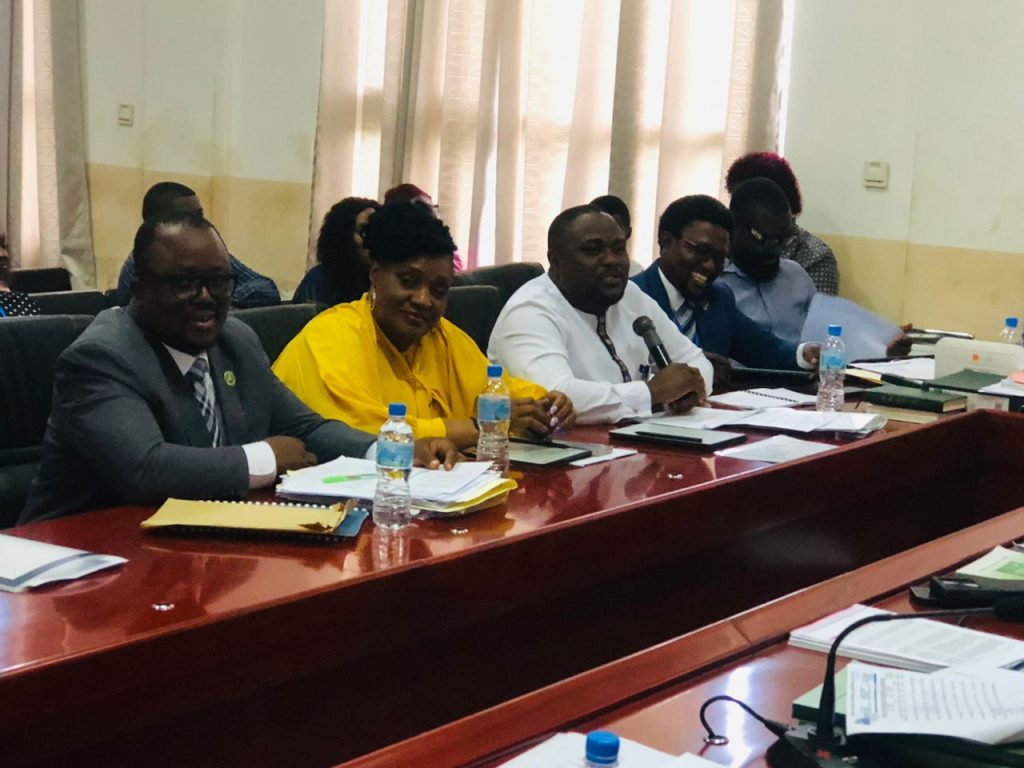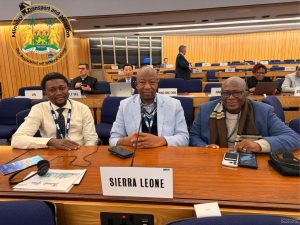SLPHA GM Bio Appeals to Parliament for Support on Privatization Issues

By Abdul Rahman Bah On Monday, November 11, 2024, Yankuba Askia Bio, the General Manager of the Sierra Leone Port and Harbour Authority (SLPHA), presented before the Public Accounts Committee (PAC) at the Parliament Tower Hill in Freetown. The session, aimed at addressing significant financial and operational challenges faced by the Port Authority, was marked by a candid and thorough exchange of ideas and solutions.
Yankuba began by providing a comprehensive historical overview of the Port Authority’s evolution, focusing on the critical transition to privatization in 2010. He explained that the Port and Harbour Authority, in its early days, had full responsibility for all operational aspects of the port. However, as part of a strategic move to modernize and improve efficiency, the government privatized key functions such as cargo handling, logistics, and other services. This shift, while aimed at optimizing port operations, reduced the Port Authority’s direct involvement in day-to-day operations, reshaping its role into a more regulatory and supervisory one.
Following privatization, the Port and Harbour Authority became a self-sustaining entity, relying exclusively on the revenue it generated, without any governmental subsidies. Yankuba pointed out, however, that much of the revenue derived from marine charges—its main source of income—was directed to the government through concession fees, leaving the Port Authority with limited funds to cover its operational expenses. This arrangement, according to Yankuba, has created a significant financial strain on the authority, limiting its ability to address critical operational needs.
Yankuba further delved into the legal framework governing the Port and Harbour Authority, particularly the complex structure for revenue collection and distribution. While the Port Authority generates revenue primarily through marine charges, it does not receive a direct share of the concession fees paid by private operators. This legal setup, he explained, places considerable financial pressure on the authority, making it difficult to fund essential services such as piloting and fuel costs—services necessary to guide vessels safely into port. Despite the lack of direct revenue for these operations, the Port Authority is still obligated to fund these services from its own limited resources.
In addition, Yankuba pointed out the paradox within the financial structure: the Port and Harbour Authority continues to meet its financial obligations to various government entities, including the National Revenue Authority (NRA) and the National Social Security and Insurance Trust (NASSIT). However, he highlighted a significant concern that other government agencies are not consistently meeting their own financial obligations, creating a lopsided financial burden on the Port and Harbour Authority. He argued that, for the sake of fairness, any waivers or exemptions granted to one agency should be uniformly applied to all entities, ensuring equal treatment across government departments.
At the conclusion of his presentation, Yankuba made a passionate appeal for legislative and policy changes. He stressed the urgency of revising the current legal and financial framework to better align the Port Authority’s operational needs with available revenue streams. He advocated for a more equitable distribution of concession fees, proposing that a portion of these funds be allocated directly to the Port Authority to support its day-to-day operations, including essential services such as piloting, fuel, and maintenance of port infrastructure.
Yankuba also called for clearer delineation of roles between the Port and Harbour Authority and private operators to ensure that the authority has sufficient control and oversight over port operations. He argued that legislative action was critical to resolving the current financial constraints and ensuring the Port and Harbour Authority’s continued capacity to fulfill its vital role in the country’s maritime sector.
In his final remarks, Yankuba appealed to the Ministry of Finance and Parliament to provide the necessary policy support and legislative backing to facilitate the Port and Harbour Authority’s financial sustainability. He underscored the need for changes to the legal framework to provide the authority with the resources it needs to function effectively, maintain services, and contribute to the country’s economic development.
Yankuba ‘s address highlighted the broader challenges faced by the Sierra Leone Port and Harbour Authority, which is central to the nation’s trade and commerce. With increased government support and legislative reform, he expressed hope that the Port and Harbour Authority could overcome its financial hurdles and continue to serve as a key pillar of Sierra Leone’s economy.
The Public Accounts Committee session ended with a commitment from lawmakers to further explore the issues raised by the General Manager and to engage with relevant stakeholders to address the financial and operational challenges facing the Port and Harbour Authority.





